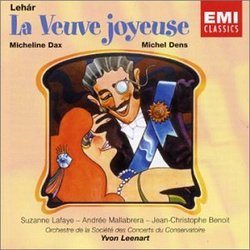| All Artists: Franz Lehar, Yvon Leenart, Paris Conservatory Concert Society Orchestra, Andre Mallabrera, Christos Grigoriou, Denise Benoit, Jacques Pruvost, Jean-Christophe Benoit, Michael Dens, Suzanne Lafaye Title: Lehár: La Veuve Joyeuse Members Wishing: 0 Total Copies: 0 Label: Angel Records Release Date: 8/5/2002 Album Type: Import Genre: Classical Styles: Opera & Classical Vocal, Historical Periods, Modern, 20th, & 21st Century Number of Discs: 2 SwapaCD Credits: 2 UPC: 724357409421 |
Search - Franz Lehar, Yvon Leenart, Paris Conservatory Concert Society Orchestra :: Lehár: La Veuve Joyeuse
 | Franz Lehar, Yvon Leenart, Paris Conservatory Concert Society Orchestra Lehár: La Veuve Joyeuse Genre: Classical
|
Larger Image |
CD Details |
CD ReviewsA Merry Widow quite in the Parisian style! L. E. Cantrell | Vancouver, British Columbia Canada | 05/15/2004 (5 out of 5 stars) "Source: 1967 studio recording from EMI Music France Text: Traditional French translation of "Die lustige Witwe" by Victor Leon and Leo Stein. Musical text is essentially that of the 1905 version without the later interpolations by the composer. Format: Two disks: 45.44 and 46.37. Dialogue tracks are segregated from music tracks. Sound quality: Good 1960s stereo. Documentation: Short essay on the history of the operetta (in French only). Summary of plot by act (French only). Track list with timings. Advertisement for the twelve French language operettas in this series. Almost nothing on the circumstances of the recording and nothing at all on the cast. In 1861, Henri Meilhac, one of the librettists for "Carmen", wrote a romantic comedy called "L'Attache d'ambassade". In 1905 the old play was dusted off and adapted into a German language operetta libretto. It was given a new name and set to music by an Austrian, Franz Lehar. Starting in Vienna, it quickly conquered Hamburg, Berlin, London and New York before arriving in Paris in April 1909. Before appearing before the Parisians, however, the operetta suffered a seachange. Danilo's fatherland of Pontevedro became Marsovia, Hanna Glawari morphed into the widow Missia Palmieri, Valencienne became Nadia, Baron Zeta became Baron Popoff and for no reason comprehensible to me, Camille de Rossilon became Camille de Coutonion. This is one of a series of twelve French language operettas issued by EMI Music France in the 1960s. It fully adheres to the excellent standards of the series. "La Veuve joyeuse" is conceived here as very much an operetta rather than an opera. All the voices are good in a cast generally assembled more for brightness and agility than for sonority. This is particularly true of Michelline Dax, an admirable Widow with a bright, ingenue-ish sound. In an ideal world I might prefer a singer who sounds a little older and has a mezzo-ish tinge in her voice, but I certainly can't object to what Dax offers here. Michel Dens is a rather more suave Danilo than most on record and for once it is possible to see what the richest woman in Marsovia (or even Pontevedro) might see in the wastrel, layabout attache at her country's Parisian embassy. What I take to be the traditional orchestration is used but the orchestra sounds more substantial and sonorous than any band I have actually heard in a theater. Yvon Leenart's conducting is precise and on the brisk side, in keeping with the operetta approach chosen for this series. I became familiar with and performed in "The Merry Widow" in the English translation current in the 1950s and 60s (glowingly recorded for Columbia by Dorothy Kirsten and Robert Rounseville in a single-disk version that still appears from time to time.) While I am aware of the Viennese quality of the music, the German text, nevertheless, has always struck me as harsh and spiky for a story in which Paris is as much a character as Danilo or the Widow. To my ear, at least, this French language version seems entirely appropriate." HAVE YOU HEARD ABOUT HER? ALAIN ROBERT | ST-HUBERT,QUÉBEC | 01/18/2003 (5 out of 5 stars) "If you are an operetta freak,i won't have to sell to you this work because you should know it.It is the most famous work of the genre along with LA VIE PARISIENNE.It is also hard to tell which recording is the best available;it depends naturally of the language you are most familiar with.The originality of LA VEUVE JOYEUSE among other things is that there is no real overture at the beginning and it also makes fun of adultry in many ways.Like so many masterpieces like PORGY AND BESS,it had an uneasy early career until it's success became contagious worldwide.More than many work of the genre,the dialogue is used like in a real play and is not there only to fill the time between the songs.Finally,LA VEUVE JOYEUSE symbolize the belle époque era perfectly;it's a tribute to a time when AUSTRIA was the center of the cultural life.Who can resist L'HEURE EXQUISE?It's so romantic.This recording was made in 1967,and was the first of many revivals of the classics operettas in FRANCE that were all recorded."
|

 Track Listings (13) - Disc #1
Track Listings (13) - Disc #1